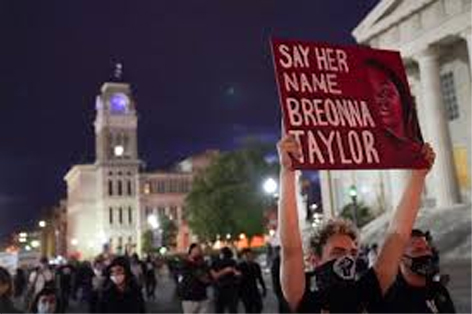Louisville, Sep 25: In the wake of the decision not to prosecute Kentucky police officers for killing Breonna Taylor, authorities and activists alike wrestled Thursday with the question of what comes next amid continued demands for justice in the Black woman’s death.
“The question obviously is: What do we do with this pain?” Louisville Mayor Greg Fischer said during a news conference. “There is no one answer, no easy answer to that question.”
Fischer pleaded for calm a day after peaceful protests in Louisville turned violent, and a gunman shot and wounded two police officers.
Activists, who were back out chanting Taylor’s name and marching for a second night as police in riot gear blocked roads, vowed to press on after a grand jury Wednesday didn’t bring homicide charges against the officers who burst into her apartment during a drug investigation in March.
Taylor, an emergency medical worker, was shot multiple times by white officers after Taylor’s boyfriend fired at them, authorities said. He said he didn’t know who was coming in and opened fire in self-defense. Police entered on a warrant connected to a suspect who did not live there, and no drugs were found inside.
State Attorney General Daniel Cameron said the investigation showed officers acted in self-defense; one was wounded. A single officer was charged with wanton endangerment for firing into neighboring apartments.
The only possibility for criminal charges against the officers for the killing itself seems to rest with the U.S. Justice Department. The FBI is still investigating whether Taylor’s civil rights were violated. But the burden of proof for such cases is very high, with prosecutors having to prove officers knew they were acting illegally and made a willful decision to cause someone’s death.
Returning Thursday to the park in downtown Louisville that has been the hub for protesters, Reginique Jones said she’ll keep pressing for increased police accountability and for a statewide ban on “no knock” warrants — the kind issued in the Taylor case, though Cameron said the investigation showed police did announce themselves before entering.
“I believe that we are going to get past this,” Jones said. “We can still get some justice.” Taylor’s family planned to weigh in at a news conference scheduled for Friday in the park that’s become known as Injustice Square.
Demonstrators kept gathering there Thursday, while others marched through downtown, where police in riot gear turned out in force as the nighttime curfew passed and crowds blocked some roads. Officers blocked the exits of a church where protesters had gathered and have detained some people, including one man they tackled and put in a spit hood.
Kenyatta Hicks said he’s encouraged by increasingly diverse crowds that have turned out to protest.
“Nobody should give up,” Hicks said.
Activists, celebrities and everyday Americans have called for charges against police since Taylor’s death. Along with George Floyd, a Black man killed by police in Minneapolis, Taylor’s name became a rallying cry during nationwide protests this summer that called out entrenched racism and demanded police reform.
The grand jury’s decision set off a new wave of protests nationwide, with people marching in cities like Philadelphia and Rochester, New York, on Thursday, a night after violence marred some demonstrations in cities like Seattle and Portland, Oregon.
Louisville’s mayor has instituted a curfew through the weekend, and Gov. Andy Beshear called up the National Guard for “limited missions.” Protesters streamed through the streets, where stopped cars honked and one man leaned out a sunroof, his fist in the air and shouted, “Black lives matter.” Earlier, it got heated between some protesters and a group of 12 to 15 armed white people wearing military-style uniforms, but it didn’t turn physical.
Peaceful protests a night earlier gave way to fires set in garbage cans, damage to several vehicles and thefts at stores. Then, two officers were shot.
Larynzo D. Johnson, 26, was charged, and an arrest citation said police had video of him opening fire. Court records did not list a lawyer for Johnson, who was scheduled to be in court Friday.
The two officers were “doing well and will survive their injuries,” interim Police Chief Robert Schroeder said.
Maj. Aubrey Gregory was shot in the hip and has been released from the hospital. Officer Robinson Desroches was shot in the abdomen and underwent surgery. Taylor’s case has exposed the wide gulf between public opinion on justice for those who kill Black Americans and the laws under which those officers are charged, which regularly favor police.
Since Taylor’s killing, Louisville has taken some steps to address protesters’ concerns. The officer who was eventually charged has been fired, and three others were put on desk duty. Officials have banned no-knock warrants and hired its first Black woman as the new permanent police chief.
Last week, the city agreed to more police reforms as part of a settlement that included a $12 million payment to Taylor’s family. But many have expressed frustration that more has not been done.
A grand jury returned three charges of wanton endangerment against Officer Brett Hankison that each carries a sentence of up to five years. The other officers involved weren’t charged.
Hankison’s attorney, David Leightty, did not return calls requesting comment. He previously said Hankison’s firing in June was a “cowardly political act.” (AGENCIES)


